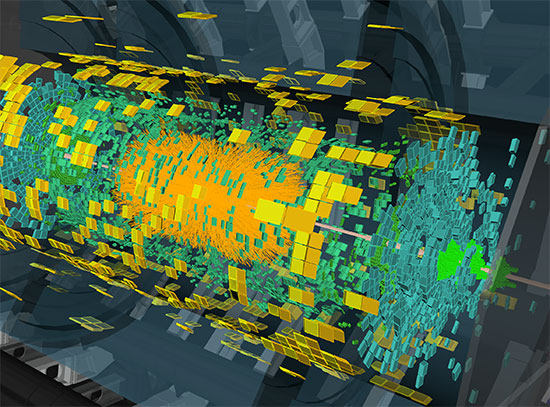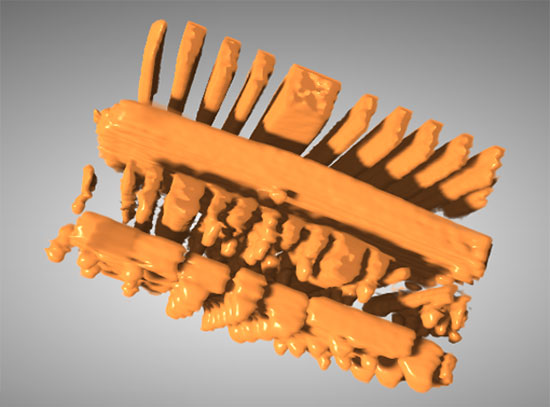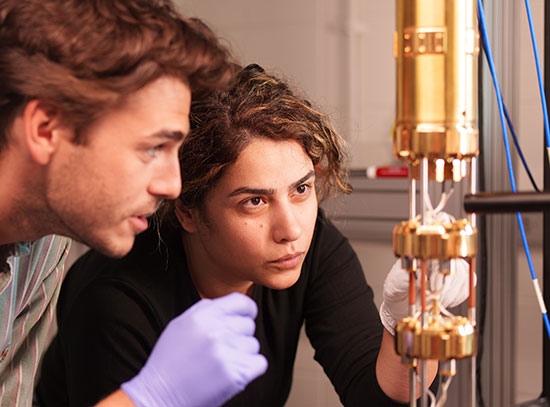Dark Matter Day Is Approaching … but Don't Be Afraid of the Dark
June 27, 2017

The following news release was issued yesterday by the Interactions Collaboration, which represents the world's particle physics laboratories. Scientists and science educators from the U.S. Department of Energy’s Brookhaven National Laboratory will be participating in several “Dark Matter Day” events this fall. Stay tuned for more details as we get closer to Dark Matter Day.
A global hunt for the universe’s missing matter is underway, and this autumn everyone is invited to join in.
On and around October 31, 2017, events around the world will celebrate the hunt for the universe’s unseen “dark matter.” Dark Matter Day events will engage the public in discussions about dark matter, and about the many experiments that seek to solve its mysteries.
Universities, laboratories, institutions and individuals are invited to organize a Dark Matter Day event in their area or online. Events could include a public lecture on dark matter, a tour of a science laboratory or experiment connected with the search for dark matter, a dark matter-themed planetarium show or film presentation, Q&A with a scientist live or online, classroom presentation…the sky is the limit.
The www.darkmatterday.com website includes resources that can help you find and connect with local dark matter experts, plan a program for a particular audience, and promote and share your events with the world.
Just want to attend an event? You don’t need a PhD to explore dark matter’s mysteries—just curiosity. Anyone who wants to learn about dark matter—adults, kids, non-scientists, scientists, science educators, students—is encouraged to attend local Dark Matter Day events on or leading up to October 31, 2017. Go to www.darkmatterday.com to sign up to be notified of events near you.
Check out some of the other offerings at darkmatterday.com:
- A Dark Matter Day FAQ to answer your questions about the purpose of this premier effort.
- An Event Starter Kit to help plan a Dark Matter Day event yourself.
- A Submit an Event form to let us know about your event so we can help spread the word.
- A Find an Event feature so we can let you know about upcoming Dark Matter Day events near you.
What is dark matter?
Dark matter explains how galaxies spin at a faster-than-expected rate without coming apart. Scientists know from these and other space observations that there is “missing” mass—something we can’t see—that makes up an estimated 85 percent of the total mass of the universe. So a big part of the universe is largely unknown to us.
Finding out what dark matter is made of is a pressing pursuit in physics. We don’t yet know if it’s composed of undiscovered particles or whether it requires some other change in our understanding of the universe’s laws of physics. A host of innovative experiments are searching for the source of dark matter using different types of tools, such as mile-deep detectors, powerful particle beams, and space-based and ground-based telescopes.
Why is there a day dedicated to dark matter?
Revealing dark matter’s true nature will tell us a lot about the origins, evolution, and overall structure in the universe, and will reshape our understanding of physics.
Dark Matter Day events are intended to educate the public about the importance of learning all we can about dark matter to develop a fuller picture of the unseen universe. Focusing more brainpower and scientific resources on dark matter’s mysteries could lead to new ideas and new discoveries.
Who is behind Dark Matter Day?
This first-ever Dark Matter Day campaign was conceived by the Interactions Collaboration, a group of science communicators representing the world’s particle physics laboratories. The collaboration also runs the www.darkmatterday.com website as a resource for people who want to host or attend local Dark Matter Day events.
Need more help?
Members of the Interactions Collaboration want you to be a part of Dark Matter Day. Please send an email to darkmatterday@interactions.org with any questions, comments, or suggestions.
###
The Interactions Collaboration (Interactions.org) seeks to support the international science of particle physics and to set visible footprints for peaceful collaboration across all borders. The www.darkmatter.com website was developed and is jointly maintained by the Interactions Collaboration, whose members represent the world's particle physics laboratories and institutions in Europe, North America, Asia, and Australia, with funding provided by science funding agencies from many nations.
2017-12325 | INT/EXT | Newsroom









